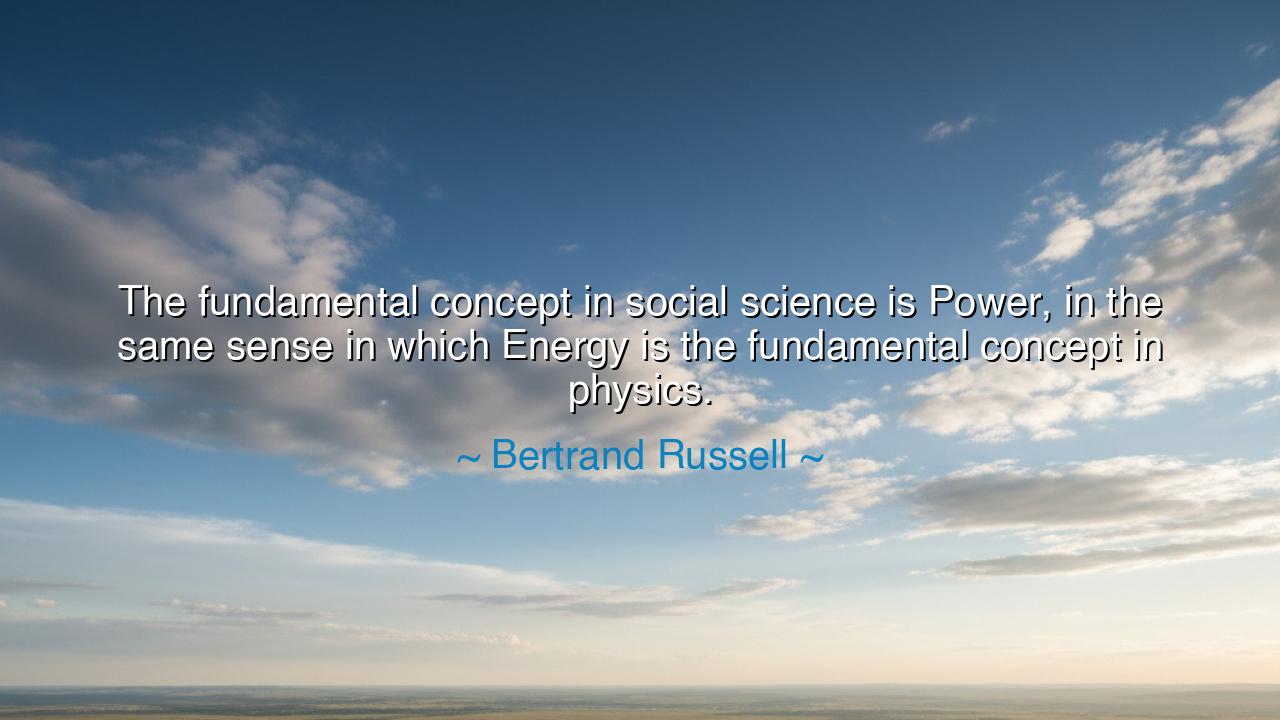
The fundamental concept in social science is Power, in the same
The fundamental concept in social science is Power, in the same sense in which Energy is the fundamental concept in physics.






Hear now, O children of the future, for the wise words of Bertrand Russell speak of a truth as profound as the forces that govern the cosmos. "The fundamental concept in social science is Power, in the same sense in which Energy is the fundamental concept in physics." These words are not merely a statement about social science, but a reflection on the very essence of human interaction and existence. Just as Energy is the unseen force that drives the universe, so too is Power the unseen force that drives human societies. Power—it is the force that shapes nations, that binds or divides people, that builds empires or topples them. Without understanding Power, no scholar of humanity can truly understand the nature of our world.
Let us consider, O children, the ancient teachings of Plato, who, in his writings, explored the nature of Power and its effects on the soul. Plato understood that Power was not merely a physical force, like the strength of a warrior or the might of an army. It was a force that resided in the very heart of human nature. In his work The Republic, he examined the ways in which rulers used Power and the consequences of their actions. Plato warned that those who wielded Power must do so with wisdom, for unchecked Power could lead to tyranny and corruption. Just as Energy can be harnessed to move the physical world, Power can be harnessed to move the social world, but only if it is guided by the principles of justice and wisdom.
In the world of science, Energy is a force that moves through everything, binding the universe together. It is both the cause and effect of the motions of the stars, the flow of rivers, and the actions of atoms. It is the fundamental force that underpins all physical existence. But in the world of human society, Power is no less fundamental. It is the force that governs relationships between individuals, groups, and nations. Without Power, societies would be mere collections of isolated individuals, unable to achieve anything greater than the sum of their parts. Russell’s words echo this truth: that just as Energy is essential to the physical world, so Power is essential to the social world.
Consider, O children, the rise and fall of empires, those mighty structures of Power that shaped the course of history. The Roman Empire, that great civilization that spanned the known world, was built on Power—the Power of its military, the Power of its laws, and the Power of its leaders. But as the empire grew, so did its corruption. The rulers of Rome, seduced by the intoxicating allure of Power, began to use it for personal gain rather than the good of the people. And so, the empire crumbled. The lesson here is clear: Power is not inherently good or evil. It is how it is wielded, whether by the wise or the wicked, that determines its impact on the world.
Let us also turn our gaze to the example of Mahatma Gandhi, whose nonviolent resistance against British rule in India demonstrated a different use of Power. Gandhi did not seek to overthrow the British through force, but through the Power of nonviolent resistance, of civil disobedience, of moral authority. In doing so, he showed the world that Power does not have to be physical or violent to be effective. Gandhi’s use of Power was rooted in the belief that true strength comes from within, from the moral force of the individual and the collective will of the people. His life stands as a testament to the idea that Power is not only the force of the ruler or the warrior, but also the force of the conscience, the spirit, and the community.
In our own time, O children, we see Power manifesting in many forms: in governments, in corporations, in social movements, and in the hearts of individuals. Russell’s words remind us that Power is not something we can escape from—it is present in every aspect of our lives, from the smallest interactions to the grandest struggles. It is a force that shapes the choices we make and the paths we walk. Power can build or destroy, create or annihilate. It can bring freedom or it can bring oppression. The question is not whether we will have Power, but how we will use it.
Thus, O children, the lesson that Russell imparts is clear: Power is as fundamental to the social world as Energy is to the physical world. It is a force that cannot be ignored or denied. To understand society, to understand history, to understand human relationships, one must understand the nature of Power—how it is wielded, who holds it, and to what end it is directed. Do not seek to shy away from Power, but seek to understand it. Use it wisely, for as Plato and Gandhi have shown, the way Power is directed shapes the very course of humanity. Embrace the responsibility that comes with it, and let your use of Power serve not just your own ends, but the greater good of all.






AAdministratorAdministrator
Welcome, honored guests. Please leave a comment, we will respond soon